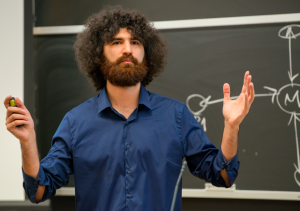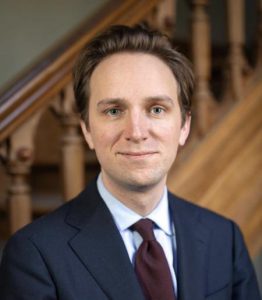Short-Term Visitors, 2023-2024
 Daron Acemoglu is an Institute Professor at MIT and an elected fellow of the National Academy of Sciences, American Philosophical Society, the British Academy of Sciences, the Turkish Academy of Sciences, the American Academy of Arts and Sciences, the Econometric Society, the European Economic Association, and the Society of Labor Economists. He is also a member of the Group of Thirty. He is the author of five books, including: Why Nations Fail: Power, Prosperity, and Poverty (joint with James Robinson), Introduction to Modern Economic Growth, and The Narrow Corridor: States, Societies, and the Fate of Liberty (with James Robinson). His academic work covers a wide range of areas, including political economy, economic development, economic growth, technological change, inequality, labor economics, and economics of networks. Acemoglu received the inaugural T. W. Shultz Prize from the University of Chicago in 2004, and the inaugural Sherwin Rosen Award for outstanding contribution to labor economics in 2004, Distinguished Science Award from the Turkish Sciences Association in 2006, the John von Neumann Award, Rajk College, Budapest in 2007, the Carnegie Fellowship in 2017, the Jean-Jacques Laffont Prize in 2018, the Global Economy Prize in 2019, and the CME Mathematical and Statistical Research Institute prize in 2021. Acemoglu received a BA from the University of York, and PhD and MSc. degrees from the London School of Economics.
Daron Acemoglu is an Institute Professor at MIT and an elected fellow of the National Academy of Sciences, American Philosophical Society, the British Academy of Sciences, the Turkish Academy of Sciences, the American Academy of Arts and Sciences, the Econometric Society, the European Economic Association, and the Society of Labor Economists. He is also a member of the Group of Thirty. He is the author of five books, including: Why Nations Fail: Power, Prosperity, and Poverty (joint with James Robinson), Introduction to Modern Economic Growth, and The Narrow Corridor: States, Societies, and the Fate of Liberty (with James Robinson). His academic work covers a wide range of areas, including political economy, economic development, economic growth, technological change, inequality, labor economics, and economics of networks. Acemoglu received the inaugural T. W. Shultz Prize from the University of Chicago in 2004, and the inaugural Sherwin Rosen Award for outstanding contribution to labor economics in 2004, Distinguished Science Award from the Turkish Sciences Association in 2006, the John von Neumann Award, Rajk College, Budapest in 2007, the Carnegie Fellowship in 2017, the Jean-Jacques Laffont Prize in 2018, the Global Economy Prize in 2019, and the CME Mathematical and Statistical Research Institute prize in 2021. Acemoglu received a BA from the University of York, and PhD and MSc. degrees from the London School of Economics.
 Lyn Alden is a financial analyst with a background in engineering and management. She spent over a decade at the Federal Aviation Administration’s William J. Hughes Technical Center in a variety of technical and financial roles, with the most recent being the head engineer and financial allocator for the center’s simulation branch. In 2016 she founded Lyn Alden Investment Strategy, which provides research to retail and institutional investors with a focus on monetary systems and energy systems. Lyn is a general partner at the bitcoin-focused venture firm Ego Death Capital, is a board director at the financial technology firm Swan Bitcoin, and is the author of Broken Money, which explores the past, present, and future of money through the lens of technology. She has a bachelor’s in Electronics Engineering from Penn State University and a master’s in Engineering Management from Rowan University, with a focus on Engineering Economics and Financial Modeling.
Lyn Alden is a financial analyst with a background in engineering and management. She spent over a decade at the Federal Aviation Administration’s William J. Hughes Technical Center in a variety of technical and financial roles, with the most recent being the head engineer and financial allocator for the center’s simulation branch. In 2016 she founded Lyn Alden Investment Strategy, which provides research to retail and institutional investors with a focus on monetary systems and energy systems. Lyn is a general partner at the bitcoin-focused venture firm Ego Death Capital, is a board director at the financial technology firm Swan Bitcoin, and is the author of Broken Money, which explores the past, present, and future of money through the lens of technology. She has a bachelor’s in Electronics Engineering from Penn State University and a master’s in Engineering Management from Rowan University, with a focus on Engineering Economics and Financial Modeling.
 Gayane Baghumyan is a 2023 Stapleton Scholars Award recipient, and a fifth-year PhD student and Junior Researcher at CERGE-EI. Her main research interests are experimental and behavioral economics, and she is currently working on two projects: Sexual-orientation discrimination and biological attributions: Experimental evidence from Russia; and Causal evidence of the role of religiosity on sexual-orientation discrimination. Furthermore, Baghumyan explores the most effective ways to inform the general population about the dangers of climate change and how the presentation of information can impact individuals’ beliefs and attitudes in this domain. Baghumyan received her BA and MA degrees in economics from the Armenian State University of Economics (ASUE) in Yerevan, Armenia.
Gayane Baghumyan is a 2023 Stapleton Scholars Award recipient, and a fifth-year PhD student and Junior Researcher at CERGE-EI. Her main research interests are experimental and behavioral economics, and she is currently working on two projects: Sexual-orientation discrimination and biological attributions: Experimental evidence from Russia; and Causal evidence of the role of religiosity on sexual-orientation discrimination. Furthermore, Baghumyan explores the most effective ways to inform the general population about the dangers of climate change and how the presentation of information can impact individuals’ beliefs and attitudes in this domain. Baghumyan received her BA and MA degrees in economics from the Armenian State University of Economics (ASUE) in Yerevan, Armenia.
 Michael Bordo is a Board of Governors Professor of Economics and director of the Center for Monetary and Financial History at Rutgers University. He has held previous academic positions at the University of South Carolina and Carleton University. Bordo has been a visiting professor at the University of California, Los Angeles, Carnegie Mellon University, Princeton University, Harvard University, and Cambridge University, where he was Pitt Professor of American History and Institutions. He is currently a Distinguished Visiting Fellow at the Hoover Institution, Stanford University. He has been a visiting scholar at the International Monetary Fund, the Federal Reserve Banks of St. Louis, Cleveland, and Dallas, the Federal Reserve Board of Governors, the Bank of Canada, the Bank of England, and the Bank for International Settlement. He is a research associate of the National Bureau of Economic Research. He is also a member of the Shadow Open Market Committee. He has a BA degree from McGill University, an MSc in economics from the London School of Economics, and PhD from the University of Chicago. He has published many articles in leading journals and eighteen books on monetary economics and monetary history. His latest book is The Historical Performance of the Federal Reserve: The Importance of Rules (2019). He is editor of a series of books for Cambridge University Press: Studies in Macroeconomic History.
Michael Bordo is a Board of Governors Professor of Economics and director of the Center for Monetary and Financial History at Rutgers University. He has held previous academic positions at the University of South Carolina and Carleton University. Bordo has been a visiting professor at the University of California, Los Angeles, Carnegie Mellon University, Princeton University, Harvard University, and Cambridge University, where he was Pitt Professor of American History and Institutions. He is currently a Distinguished Visiting Fellow at the Hoover Institution, Stanford University. He has been a visiting scholar at the International Monetary Fund, the Federal Reserve Banks of St. Louis, Cleveland, and Dallas, the Federal Reserve Board of Governors, the Bank of Canada, the Bank of England, and the Bank for International Settlement. He is a research associate of the National Bureau of Economic Research. He is also a member of the Shadow Open Market Committee. He has a BA degree from McGill University, an MSc in economics from the London School of Economics, and PhD from the University of Chicago. He has published many articles in leading journals and eighteen books on monetary economics and monetary history. His latest book is The Historical Performance of the Federal Reserve: The Importance of Rules (2019). He is editor of a series of books for Cambridge University Press: Studies in Macroeconomic History.
 Chanelle Duley is a lecturer (assistant professor) in economics at the University of Auckland, where she completed a PhD in economics in February 2023. Her research focuses on topics in international economics, banking, macroeconomics, and political economy. She is currently working on projects on friendshoring and firm boundaries, as well as on cultural assimilation and nation building. Her work on friendshoring explores how strategic uncertainty determines the boundary of a firm, and the incentives of policymakers to shift critical parts of international supply chains to allies and friendly trading partners. In her work on cultural assimilation, Duley develops a game-theoretic model to investigate how cultural values facilitate market and non-market based exchange, and the distributional effects of nation building policies that foster assimilation or biculturalism. In 2022, Duley completed a PhD Fellowship at the Bank for International Settlements.
Chanelle Duley is a lecturer (assistant professor) in economics at the University of Auckland, where she completed a PhD in economics in February 2023. Her research focuses on topics in international economics, banking, macroeconomics, and political economy. She is currently working on projects on friendshoring and firm boundaries, as well as on cultural assimilation and nation building. Her work on friendshoring explores how strategic uncertainty determines the boundary of a firm, and the incentives of policymakers to shift critical parts of international supply chains to allies and friendly trading partners. In her work on cultural assimilation, Duley develops a game-theoretic model to investigate how cultural values facilitate market and non-market based exchange, and the distributional effects of nation building policies that foster assimilation or biculturalism. In 2022, Duley completed a PhD Fellowship at the Bank for International Settlements.
 Amy Finkelstein is the John & Jennie S. MacDonald Professor of Economics at the Massachusetts Institute of Technology. Prior to joining the MIT faculty in 2005, she was a Junior Fellow at the Harvard Society of Fellows. She is the co-founder and co-scientific director of J-PAL North America, a research center at MIT that encourages and facilitates randomized evaluations of important domestic policy issues. She is also the founding editor of American Economic Review: Insights and the co-director of the Health Care Program at the National Bureau of Economic Research. She is a member of the National Academy of Sciences and of the Institute of Medicine, and a fellow of the American Academy of Arts and Sciences and of the Econometric Society. Finkelstein’s areas of specialization are public finance and health economics. Her research focuses on market failures and government intervention in insurance markets, and on the economics of healthcare delivery. From 2008-2020 she served as co-director of the Public Economics Program at the National Bureau of Economic Research. She has received numerous awards and fellowships for her research, including a MacArthur Foundation Fellowship (2018) and the John Bates Clark Medal (2012), given annually to the economist under the age of 40 who is judged to have made the most significant contribution to economic thought and knowledge. Finkelstein received her PhD in economics from MIT, an M.Phil in economics from Oxford University where she studied as a Marshall Scholar, and an AB in government from Harvard University.
Amy Finkelstein is the John & Jennie S. MacDonald Professor of Economics at the Massachusetts Institute of Technology. Prior to joining the MIT faculty in 2005, she was a Junior Fellow at the Harvard Society of Fellows. She is the co-founder and co-scientific director of J-PAL North America, a research center at MIT that encourages and facilitates randomized evaluations of important domestic policy issues. She is also the founding editor of American Economic Review: Insights and the co-director of the Health Care Program at the National Bureau of Economic Research. She is a member of the National Academy of Sciences and of the Institute of Medicine, and a fellow of the American Academy of Arts and Sciences and of the Econometric Society. Finkelstein’s areas of specialization are public finance and health economics. Her research focuses on market failures and government intervention in insurance markets, and on the economics of healthcare delivery. From 2008-2020 she served as co-director of the Public Economics Program at the National Bureau of Economic Research. She has received numerous awards and fellowships for her research, including a MacArthur Foundation Fellowship (2018) and the John Bates Clark Medal (2012), given annually to the economist under the age of 40 who is judged to have made the most significant contribution to economic thought and knowledge. Finkelstein received her PhD in economics from MIT, an M.Phil in economics from Oxford University where she studied as a Marshall Scholar, and an AB in government from Harvard University.
 Peter Ganong is an associate professor of public policy at the University of Chicago Harris School, and a faculty research fellow at the National Bureau of Economic Research. Ganong has spent two years in public service: one at the White House Council of Economic Advisers and one at the City of Boston’s Citywide Analytics Team. He has taught at the University of Chicago since 2017 and was a Visiting Assistant Professor at MIT during fall of 2021. He studies the effect of public policies on people facing difficult financial circumstances. In his research on the foreclosure crisis, he found that most borrowers defaulted due to insufficient liquidity and that many foreclosures could have been averted through liquidity-focused modifications to mortgages. He also has found that unemployment benefits play a crucial role in sustaining the consumption of unemployed workers. In ongoing work, he is studying the effects of racial wealth inequality and the effects of high liquidity on the US economy. Ganong received his AB in economics and math, and his PhD in economics, both from Harvard University.
Peter Ganong is an associate professor of public policy at the University of Chicago Harris School, and a faculty research fellow at the National Bureau of Economic Research. Ganong has spent two years in public service: one at the White House Council of Economic Advisers and one at the City of Boston’s Citywide Analytics Team. He has taught at the University of Chicago since 2017 and was a Visiting Assistant Professor at MIT during fall of 2021. He studies the effect of public policies on people facing difficult financial circumstances. In his research on the foreclosure crisis, he found that most borrowers defaulted due to insufficient liquidity and that many foreclosures could have been averted through liquidity-focused modifications to mortgages. He also has found that unemployment benefits play a crucial role in sustaining the consumption of unemployed workers. In ongoing work, he is studying the effects of racial wealth inequality and the effects of high liquidity on the US economy. Ganong received his AB in economics and math, and his PhD in economics, both from Harvard University.
 Anne Sophie Lassen is a postdoctoral researcher in the Department of Economics at Copenhagen Business School, where she completed her PhD in economics in November 2022. Her research is primarily concerned with the mechanisms behind and implications of gender differences in labor market choices, and work is placed within the intersection of labor, family/gender, and public economics. Lassen is particularly interested in how institutional changes and norms affect gender equality in the labor market and allocation of time to the household. In “Gender Norms and Specialization in Household Production: Evidence from a Danish Parental Leave Reform,” results indicate that mothers increase their leave by 5 weeks while the average leave duration of fathers remains unchanged, irrespectively of relative earnings. Consistent with the role of gender identity, women who had a working mother take a shorter leave than those with a stay at-home mother. Lassen holds BSc and MSc degrees in economics from the University of Copenhagen.
Anne Sophie Lassen is a postdoctoral researcher in the Department of Economics at Copenhagen Business School, where she completed her PhD in economics in November 2022. Her research is primarily concerned with the mechanisms behind and implications of gender differences in labor market choices, and work is placed within the intersection of labor, family/gender, and public economics. Lassen is particularly interested in how institutional changes and norms affect gender equality in the labor market and allocation of time to the household. In “Gender Norms and Specialization in Household Production: Evidence from a Danish Parental Leave Reform,” results indicate that mothers increase their leave by 5 weeks while the average leave duration of fathers remains unchanged, irrespectively of relative earnings. Consistent with the role of gender identity, women who had a working mother take a shorter leave than those with a stay at-home mother. Lassen holds BSc and MSc degrees in economics from the University of Copenhagen.
 David Leonhardt is a senior writer at The New York Times, where he writes its flagship newsletter, “The Morning.” He has also been the newspaper’s Washington bureau chief, an op-ed columnist, a staff writer for The New York Times Magazine, and the founding editor of “The Upshot.” Before joining The Times in 1999, he worked for Business Week magazine and The Washington Post. He won the Pulitzer Prize for commentary in 2011. He recently published his first book, Ours Was the Shining Future: The Story of the American Dream, which The Atlantic and the Financial Times called one of the best books of 2023. Leonhardt received a BS in applied mathematics from Yale University, and is a third-generation native of New York.
David Leonhardt is a senior writer at The New York Times, where he writes its flagship newsletter, “The Morning.” He has also been the newspaper’s Washington bureau chief, an op-ed columnist, a staff writer for The New York Times Magazine, and the founding editor of “The Upshot.” Before joining The Times in 1999, he worked for Business Week magazine and The Washington Post. He won the Pulitzer Prize for commentary in 2011. He recently published his first book, Ours Was the Shining Future: The Story of the American Dream, which The Atlantic and the Financial Times called one of the best books of 2023. Leonhardt received a BS in applied mathematics from Yale University, and is a third-generation native of New York.
Short-Term Visitors, 2022-2023
 Mohammad Akbarpour is an associate professor of economics at the Stanford Graduate School of Business and an associate professor of computer science (by courtesy) at Stanford University. Akbarpour’s research focuses on market design and social networks. Recently, he has worked on problems related to inequality in market design and network targeting with applications in development economics. He is also an instructor at Khan Academy Farsi, teaching hundreds of high-school level video lessons in game theory, physics, calculus, and macroeconomics. He received his Bachelor of Science in electrical engineering from Sharif University of Technology and his PhD in economics from Stanford University.
Mohammad Akbarpour is an associate professor of economics at the Stanford Graduate School of Business and an associate professor of computer science (by courtesy) at Stanford University. Akbarpour’s research focuses on market design and social networks. Recently, he has worked on problems related to inequality in market design and network targeting with applications in development economics. He is also an instructor at Khan Academy Farsi, teaching hundreds of high-school level video lessons in game theory, physics, calculus, and macroeconomics. He received his Bachelor of Science in electrical engineering from Sharif University of Technology and his PhD in economics from Stanford University.
 J. Bradford DeLong is a professor of economics at the University of California, Berkeley, a research associate of the National Bureau of Economic Research, a weblogger at the Washington Center for Equitable Growth, and a fellow of the Institute for New Economic Thinking. He joined UC Berkeley as an associate professor in 1993 and became a full professor in 1997. DeLong also served as Deputy Assistant Secretary of the Treasury for Economic Policy from 1993 to 1995. He worked on the Clinton Administration’s 1993 budget, on the Uruguay Round of the General Agreement on Tariffs and Trade, on the North American Free Trade Agreement, on macroeconomic policy, and on the unsuccessful health care reform effort. Before joining the Treasury Department, DeLong was Danziger Associate Professor in the Department of Economics at Harvard University. He has also been a John M. Olin Fellow at the National Bureau of Economic Research, an assistant professor of economics at Boston University, and a lecturer in the Department of Economics at M.I.T. DeLong is the author of Slouching Towards Utopia: An Economic History of the Twentieth Century (2022) and co-author, with Martha Olney, of the textbook Macroeconomics (2002). He also co-edited After Piketty: The Agenda for Economics and Inequality (2017) with Heather Boushey and Marshall Steinbaum; and co-authored Concrete Economics: The Hamilton Approach to Economic Growth and Policy (2016) with Stephen Cohen. DeLong received his BA and PhD in economics from Harvard University.
J. Bradford DeLong is a professor of economics at the University of California, Berkeley, a research associate of the National Bureau of Economic Research, a weblogger at the Washington Center for Equitable Growth, and a fellow of the Institute for New Economic Thinking. He joined UC Berkeley as an associate professor in 1993 and became a full professor in 1997. DeLong also served as Deputy Assistant Secretary of the Treasury for Economic Policy from 1993 to 1995. He worked on the Clinton Administration’s 1993 budget, on the Uruguay Round of the General Agreement on Tariffs and Trade, on the North American Free Trade Agreement, on macroeconomic policy, and on the unsuccessful health care reform effort. Before joining the Treasury Department, DeLong was Danziger Associate Professor in the Department of Economics at Harvard University. He has also been a John M. Olin Fellow at the National Bureau of Economic Research, an assistant professor of economics at Boston University, and a lecturer in the Department of Economics at M.I.T. DeLong is the author of Slouching Towards Utopia: An Economic History of the Twentieth Century (2022) and co-author, with Martha Olney, of the textbook Macroeconomics (2002). He also co-edited After Piketty: The Agenda for Economics and Inequality (2017) with Heather Boushey and Marshall Steinbaum; and co-authored Concrete Economics: The Hamilton Approach to Economic Growth and Policy (2016) with Stephen Cohen. DeLong received his BA and PhD in economics from Harvard University.
Claudia Goldin is the Henry Lee Professor of Economics at Harvard University and was the director of the NBER’s Development of the American Economy program from 1989 to 2017. She is a co-director of the NBER’s Gender in the Economy Study Group. An economic historian and a labor economist, Goldin’s research covers a wide range of topics, including the female labor force, the gender gap in earnings, income inequality, technological change, education, and immigration. Most of her research interprets the present through the lens of the past and explores the origins of current issues of concern. Her most recent book is Career & Family: Women’s Century-Long Journey toward Equity (Princeton University Press, 2021). She is the author and editor of several books, among them Understanding the Gender Gap: An Economic History of American Women (1990), The Regulated Economy: A Historical Approach to Political Economy (with G. Libecap, 1994), The Defining Moment: The Great Depression and the American Economy in the Twentieth Century (with M. Bordo and E. White, 1998), Corruption and Reform: Lesson’s from America’s Economic History (with E. Glaeser, 2006), and Women Working Longer: Increased Employment at Older Ages (with L. Katz, 2018). Her book The Race between Education and Technology (with L. Katz; 2008, 2010) was the winner of the 2008 R.R. Hawkins Award for the most outstanding scholarly work in all disciplines of the arts and sciences. Goldin is best known for her historical work on women in the US economy. Her most influential papers in that area have concerned the history of women’s quest for career and family, coeducation in higher education, the impact of the “Pill” on women’s career and marriage decisions, women’s surnames after marriage as a social indicator, the reasons why women are now the majority of undergraduates, and the new lifecycle of women’s employment. Goldin received her BA from Cornell University and her PhD from the University of Chicago.
is the Henry Lee Professor of Economics at Harvard University and was the director of the NBER’s Development of the American Economy program from 1989 to 2017. She is a co-director of the NBER’s Gender in the Economy Study Group. An economic historian and a labor economist, Goldin’s research covers a wide range of topics, including the female labor force, the gender gap in earnings, income inequality, technological change, education, and immigration. Most of her research interprets the present through the lens of the past and explores the origins of current issues of concern. Her most recent book is Career & Family: Women’s Century-Long Journey toward Equity (Princeton University Press, 2021). She is the author and editor of several books, among them Understanding the Gender Gap: An Economic History of American Women (1990), The Regulated Economy: A Historical Approach to Political Economy (with G. Libecap, 1994), The Defining Moment: The Great Depression and the American Economy in the Twentieth Century (with M. Bordo and E. White, 1998), Corruption and Reform: Lesson’s from America’s Economic History (with E. Glaeser, 2006), and Women Working Longer: Increased Employment at Older Ages (with L. Katz, 2018). Her book The Race between Education and Technology (with L. Katz; 2008, 2010) was the winner of the 2008 R.R. Hawkins Award for the most outstanding scholarly work in all disciplines of the arts and sciences. Goldin is best known for her historical work on women in the US economy. Her most influential papers in that area have concerned the history of women’s quest for career and family, coeducation in higher education, the impact of the “Pill” on women’s career and marriage decisions, women’s surnames after marriage as a social indicator, the reasons why women are now the majority of undergraduates, and the new lifecycle of women’s employment. Goldin received her BA from Cornell University and her PhD from the University of Chicago.
Hilary Hoynes is a professor of economics and public policy and holds the Haas Distinguished Chair in Economic Disparities at the University of California, Berkeley, where she also co-directs the Berkeley Opportunity Lab. Her research focuses on poverty, inequality, food and nutrition programs, and the impacts of government tax and transfer programs on low income families. She is a member of the American Academy of Arts and Sciences, the National Academy of Social Insurance, and a fellow of the Society of Labor Economists. She has served as co-editor of the American Economic Review and the American Economic Journal: Economic Policy. She currently serves on the National Academy of Sciences Committee on Building an Agenda to Reduce the Number of Children in Poverty by Half in 10 Years. Previously, she was a member of the American Economic Association’s Executive Committee and the Federal Commission on Evidence-Based Policy Making. In 2014, she received the Carolyn Shaw Bell Award from the Committee on the Status of Women in the Economics Profession of the American Economic Association. Hoynes received her undergraduate degree in economics and mathematics from Colby College and her PhD in economics from Stanford University.
is a professor of economics and public policy and holds the Haas Distinguished Chair in Economic Disparities at the University of California, Berkeley, where she also co-directs the Berkeley Opportunity Lab. Her research focuses on poverty, inequality, food and nutrition programs, and the impacts of government tax and transfer programs on low income families. She is a member of the American Academy of Arts and Sciences, the National Academy of Social Insurance, and a fellow of the Society of Labor Economists. She has served as co-editor of the American Economic Review and the American Economic Journal: Economic Policy. She currently serves on the National Academy of Sciences Committee on Building an Agenda to Reduce the Number of Children in Poverty by Half in 10 Years. Previously, she was a member of the American Economic Association’s Executive Committee and the Federal Commission on Evidence-Based Policy Making. In 2014, she received the Carolyn Shaw Bell Award from the Committee on the Status of Women in the Economics Profession of the American Economic Association. Hoynes received her undergraduate degree in economics and mathematics from Colby College and her PhD in economics from Stanford University.
 Chris Miller is an associate professor of international history at the Fletcher School of Law and Diplomacy, Tufts University, where his research focuses on technology, geopolitics, economics, international affairs, and Russia. He is author of Chip War: The Fight for the World’s Most Critical Technology, a geopolitical history of the computer chip. He is the author of three other books on Russia, including Putinomics: Power and Money in Resurgent Russia; We Shall Be Masters: Russia’s Pivots to East Asia from Peter the Great to Putin; and The Struggle to Save the Soviet Economy: Mikhail Gorbachev and the Collapse of the USSR. He has previously served as the associate director of the Brady-Johnson Program in Grand Strategy at Yale, a lecturer at the New Economic School in Moscow, a visiting researcher at the Carnegie Moscow Center, a research associate at the Brookings Institution, and as a fellow at the German Marshall Fund’s Transatlantic Academy. Miller received his PhD and MA from Yale University and his BA in history from Harvard University.
Chris Miller is an associate professor of international history at the Fletcher School of Law and Diplomacy, Tufts University, where his research focuses on technology, geopolitics, economics, international affairs, and Russia. He is author of Chip War: The Fight for the World’s Most Critical Technology, a geopolitical history of the computer chip. He is the author of three other books on Russia, including Putinomics: Power and Money in Resurgent Russia; We Shall Be Masters: Russia’s Pivots to East Asia from Peter the Great to Putin; and The Struggle to Save the Soviet Economy: Mikhail Gorbachev and the Collapse of the USSR. He has previously served as the associate director of the Brady-Johnson Program in Grand Strategy at Yale, a lecturer at the New Economic School in Moscow, a visiting researcher at the Carnegie Moscow Center, a research associate at the Brookings Institution, and as a fellow at the German Marshall Fund’s Transatlantic Academy. Miller received his PhD and MA from Yale University and his BA in history from Harvard University.
 Ricardo Reis is the A.W. Phillips Professor of Economics at the London School of Economics. Previously, he was on the faculty at Columbia University from 2008–16, and Princeton University from 2004–08. Reis is an academic consultant for the Bank of England, the Riksbank, and the Federal Reserve Bank of Richmond. He also directs the ESRC Centre for Macroeconomics in the UK, and serves on the council or as an advisor of multiple organizations. He has published widely on macroeconomics, including both monetary and fiscal policy, inflation and business cycles. His main areas of research are inflation expectations, unconventional monetary policies and the central bank’s balance sheet, disagreement and inattention, business cycle models with inequality, automatic stabilizers, sovereign-bond backed securities, and the role of capital misallocation in the European slump and crisis. Recent honors include: 2022 Carl Menger Prize jointly awarded by the Deutsche Bundesbank, the Oesterreichische Nationalbank, and the Swiss National Bank; 2021 Yrjö Jahnsson Award given by the European Economic Association; 2017 Banque de France/Toulouse School of Economics Junior Prize; and 2016 Bernácer Prize. Reis received his B.Sc. from the London School of Economics and his PhD from Harvard University.
Ricardo Reis is the A.W. Phillips Professor of Economics at the London School of Economics. Previously, he was on the faculty at Columbia University from 2008–16, and Princeton University from 2004–08. Reis is an academic consultant for the Bank of England, the Riksbank, and the Federal Reserve Bank of Richmond. He also directs the ESRC Centre for Macroeconomics in the UK, and serves on the council or as an advisor of multiple organizations. He has published widely on macroeconomics, including both monetary and fiscal policy, inflation and business cycles. His main areas of research are inflation expectations, unconventional monetary policies and the central bank’s balance sheet, disagreement and inattention, business cycle models with inequality, automatic stabilizers, sovereign-bond backed securities, and the role of capital misallocation in the European slump and crisis. Recent honors include: 2022 Carl Menger Prize jointly awarded by the Deutsche Bundesbank, the Oesterreichische Nationalbank, and the Swiss National Bank; 2021 Yrjö Jahnsson Award given by the European Economic Association; 2017 Banque de France/Toulouse School of Economics Junior Prize; and 2016 Bernácer Prize. Reis received his B.Sc. from the London School of Economics and his PhD from Harvard University.
 Azizbek Tokhirov is a PhD student at CERGE-EI and GEOMIGRACE. His main research area is development economics. He investigates the behavioral implications of local and global economic phenomena. In 2022, he was awarded the 2nd prize in the Young Economist of the Year competition conducted by the Czech Economic Society for the paper: “Female Labor Supply Consequences of Ethnic Riots: Theory and Evidence from Kyrgyzstan.” Prior to pursuing a PhD degree, he studied in a multidisciplinary GLODEP master program and received his Bachelor of Science in Economics with Finance from University of Westminster, London.
Azizbek Tokhirov is a PhD student at CERGE-EI and GEOMIGRACE. His main research area is development economics. He investigates the behavioral implications of local and global economic phenomena. In 2022, he was awarded the 2nd prize in the Young Economist of the Year competition conducted by the Czech Economic Society for the paper: “Female Labor Supply Consequences of Ethnic Riots: Theory and Evidence from Kyrgyzstan.” Prior to pursuing a PhD degree, he studied in a multidisciplinary GLODEP master program and received his Bachelor of Science in Economics with Finance from University of Westminster, London.
 Matthew Yglesias writes the “Slow Boring” blog and newsletter, and is the co-founder and former senior correspondent for Vox. He also is a regular contributor to NPR’s All Things Considered and hosted the political podcast “The Weeds.” Prior to Vox, he was a columnist for Slate, a senior fellow at the Center for American Progress, and wrote for The American Prospect and The Atlantic. He is the author of Heads in the Sand: How the Republicans Screw Up Foreign Policy and Foreign Policy Screws Up the Democrats (2008), The Rent Is Too Damn High: What To Do About It, And Why It Matters More Than You Think (2012) and, most recently, One Billion Americans: The Case for Thinking Bigger (2020): “If the most challenging crisis in living memory has shown us anything, it’s that America has lost the will and the means to lead. We can’t compete with the huge population clusters of the global marketplace by keeping our population static or letting it diminish, or with our crumbling transit and unaffordable housing. The winner in the future world is going to have more—more ideas, more ambition, more utilization of resources, more people.” Yglesias holds a BA in philosophy from Harvard University.
Matthew Yglesias writes the “Slow Boring” blog and newsletter, and is the co-founder and former senior correspondent for Vox. He also is a regular contributor to NPR’s All Things Considered and hosted the political podcast “The Weeds.” Prior to Vox, he was a columnist for Slate, a senior fellow at the Center for American Progress, and wrote for The American Prospect and The Atlantic. He is the author of Heads in the Sand: How the Republicans Screw Up Foreign Policy and Foreign Policy Screws Up the Democrats (2008), The Rent Is Too Damn High: What To Do About It, And Why It Matters More Than You Think (2012) and, most recently, One Billion Americans: The Case for Thinking Bigger (2020): “If the most challenging crisis in living memory has shown us anything, it’s that America has lost the will and the means to lead. We can’t compete with the huge population clusters of the global marketplace by keeping our population static or letting it diminish, or with our crumbling transit and unaffordable housing. The winner in the future world is going to have more—more ideas, more ambition, more utilization of resources, more people.” Yglesias holds a BA in philosophy from Harvard University.
Short-Term Visitors, 2021-2022
David Autor is the Ford Professor of Economics and associate head of the economics department at Massachusetts Institute of Technology (MIT). He also serves as co-director of the NBER Labor Studies Program; and co-leader of both the MIT Work of the Future Task Force and the Abdul Latif Jameel Poverty Action Lab (J-PAL) North America Work of the Future Initiative. His scholarship explores the labor-market impacts of technological change and globalization on job polarization, skill demands, earnings levels and inequality, and electoral outcomes. He has received numerous awards, including the National Science Foundation CAREER Award, an Alfred P. Sloan Foundation Fellowship, the Sherwin Rosen Prize for outstanding contributions to the field of Labor Economics, and the Andrew Carnegie Fellowship. Autor was recognized by Bloomberg as one of the 50 people who defined global business in 2017. He received a special award commemorating the 25th Heinz Awards Anniversary in 2020: “For transforming our understanding of how globalization and technological change are impacting jobs and earning prospects for American workers.” Autor received his BA from Tufts University in psychology (concentration in computer science) and his PhD in public policy from the John F. Kennedy School of Government at Harvard University.
is the Ford Professor of Economics and associate head of the economics department at Massachusetts Institute of Technology (MIT). He also serves as co-director of the NBER Labor Studies Program; and co-leader of both the MIT Work of the Future Task Force and the Abdul Latif Jameel Poverty Action Lab (J-PAL) North America Work of the Future Initiative. His scholarship explores the labor-market impacts of technological change and globalization on job polarization, skill demands, earnings levels and inequality, and electoral outcomes. He has received numerous awards, including the National Science Foundation CAREER Award, an Alfred P. Sloan Foundation Fellowship, the Sherwin Rosen Prize for outstanding contributions to the field of Labor Economics, and the Andrew Carnegie Fellowship. Autor was recognized by Bloomberg as one of the 50 people who defined global business in 2017. He received a special award commemorating the 25th Heinz Awards Anniversary in 2020: “For transforming our understanding of how globalization and technological change are impacting jobs and earning prospects for American workers.” Autor received his BA from Tufts University in psychology (concentration in computer science) and his PhD in public policy from the John F. Kennedy School of Government at Harvard University.
David Card is the Class of 1950 Professor of Economics at the University of California, Berkeley, and director of the Center for Labor Economics and the Econometric Lab. Before joining Berkeley he taught at University of Chicago in 1982‐83 and Princeton University from 1983 to 1996. He has held visiting appointments at Columbia University, Harvard University, UCLA, and the Center for Advanced Study in the Behavioral Sciences. From 2012 to 2017 he was director of the Labor Studies Program at the National Bureau of Economic Research. Card’s research interests include wage determination, education, inequality, immigration, and gender‐related issues. He co‐authored the 1995 book Myth and Measurement: The New Economics of the Minimum Wage, co‐edited eight additional titles, and has published over 100 journal articles and book chapters. In 1995, he received the American Economic Association’s John Bates Clark Prize, which is awarded to the economist under 40 whose work is judged to have made the most significant contribution to the field. He was president of the AEA in 2021 and co‐recipient of the Nobel Memorial Prize in Economics in 2021.
is the Class of 1950 Professor of Economics at the University of California, Berkeley, and director of the Center for Labor Economics and the Econometric Lab. Before joining Berkeley he taught at University of Chicago in 1982‐83 and Princeton University from 1983 to 1996. He has held visiting appointments at Columbia University, Harvard University, UCLA, and the Center for Advanced Study in the Behavioral Sciences. From 2012 to 2017 he was director of the Labor Studies Program at the National Bureau of Economic Research. Card’s research interests include wage determination, education, inequality, immigration, and gender‐related issues. He co‐authored the 1995 book Myth and Measurement: The New Economics of the Minimum Wage, co‐edited eight additional titles, and has published over 100 journal articles and book chapters. In 1995, he received the American Economic Association’s John Bates Clark Prize, which is awarded to the economist under 40 whose work is judged to have made the most significant contribution to the field. He was president of the AEA in 2021 and co‐recipient of the Nobel Memorial Prize in Economics in 2021.
Michael Keen is deputy director of the Fiscal Affairs Department of the International Monetary Fund, where he was previously head of the Tax Policy and Tax Coordination divisions. Before joining the Fund, he was Professor of Economics at the University of Essex and visiting Professor at Kyoto University. He has led technical assistance missions to nearly thirty countries on a wide range of issues in tax policy, and consulted for the World Bank, European Commission, and the private sector. He has served on the Board of the National Tax Association in the U.S., and on the editorial boards of American Economic Journal: Economic Policy, International Tax and Public Finance (of which he was joint founder), Journal of Public Economics, the Review of Economic Studies and many other journals. He is co-author of books on The Modern VAT, the Taxation of Petroleum and Minerals, and Changing Customs.
is deputy director of the Fiscal Affairs Department of the International Monetary Fund, where he was previously head of the Tax Policy and Tax Coordination divisions. Before joining the Fund, he was Professor of Economics at the University of Essex and visiting Professor at Kyoto University. He has led technical assistance missions to nearly thirty countries on a wide range of issues in tax policy, and consulted for the World Bank, European Commission, and the private sector. He has served on the Board of the National Tax Association in the U.S., and on the editorial boards of American Economic Journal: Economic Policy, International Tax and Public Finance (of which he was joint founder), Journal of Public Economics, the Review of Economic Studies and many other journals. He is co-author of books on The Modern VAT, the Taxation of Petroleum and Minerals, and Changing Customs.
Jonathan Levy is the James Westfall Thompson Professor of US History, Fundamentals, Social Thought, and the College at the University of Chicago. Levy is a historian of economic life and of the United States, with interests in the relationships among business history, political economy, legal history, and the history of ideas and culture. He most recently completed the book Ages of American Capitalism: A History of the United States (Random House, 2021), which is a history of American economic life from British colonial settlement through the Great Recession. Much of his recent research has sought to place investment at the center of economic history and theory, and, relatedly, to contribute towards the creation of a “Keynesian” paradigm in economic history. He is currently working on three projects. The first is a book, The Real Economy, is an essay collection on economic theory and history, with a focus on capital, corporations, and profit. Another book, The Fetish of Liquidity, is a revised version of a series of lectures he gave at the École des hautes études en sciences sociales in 2017 on global economic history since the Great Depression. The final project is a climate history of the city of Houston in the late twentieth and early twenty-first centuries. Levy wrote a series of essays on this topic in 2019 for the Visualizing Climate and Loss Project at Harvard’s Center for History and Economics.
is the James Westfall Thompson Professor of US History, Fundamentals, Social Thought, and the College at the University of Chicago. Levy is a historian of economic life and of the United States, with interests in the relationships among business history, political economy, legal history, and the history of ideas and culture. He most recently completed the book Ages of American Capitalism: A History of the United States (Random House, 2021), which is a history of American economic life from British colonial settlement through the Great Recession. Much of his recent research has sought to place investment at the center of economic history and theory, and, relatedly, to contribute towards the creation of a “Keynesian” paradigm in economic history. He is currently working on three projects. The first is a book, The Real Economy, is an essay collection on economic theory and history, with a focus on capital, corporations, and profit. Another book, The Fetish of Liquidity, is a revised version of a series of lectures he gave at the École des hautes études en sciences sociales in 2017 on global economic history since the Great Depression. The final project is a climate history of the city of Houston in the late twentieth and early twenty-first centuries. Levy wrote a series of essays on this topic in 2019 for the Visualizing Climate and Loss Project at Harvard’s Center for History and Economics.
 Nicholas Mulder is an assistant professor in the history department at Cornell University, in European and international history from the nineteenth century to the present. His research focuses on political, economic, and intellectual history, with particular attention to the era of the world wars between 1914 and 1945. His first book, The Economic Weapon: The Rise of Sanctions as a Tool of Modern War, appeared in January 2022 with Yale University Press. It is a history of the interwar origins of economic sanctions, showing how they reconfigured international affairs by enabling distant coercion against civilian societies in peacetime. Based on wartime blockade practices, the instrument of sanctions offered a novel way to prevent war. It became embedded in the League of Nations and national state policy, and spurred new economic interventions, as well as anti-liberal bids for autarky. The book argues that sanctions were a potent but unstable and unpredictable political tool, one whose importance to the international crisis of the 1930s and 1940s is much greater than usually assumed.
Nicholas Mulder is an assistant professor in the history department at Cornell University, in European and international history from the nineteenth century to the present. His research focuses on political, economic, and intellectual history, with particular attention to the era of the world wars between 1914 and 1945. His first book, The Economic Weapon: The Rise of Sanctions as a Tool of Modern War, appeared in January 2022 with Yale University Press. It is a history of the interwar origins of economic sanctions, showing how they reconfigured international affairs by enabling distant coercion against civilian societies in peacetime. Based on wartime blockade practices, the instrument of sanctions offered a novel way to prevent war. It became embedded in the League of Nations and national state policy, and spurred new economic interventions, as well as anti-liberal bids for autarky. The book argues that sanctions were a potent but unstable and unpredictable political tool, one whose importance to the international crisis of the 1930s and 1940s is much greater than usually assumed.
Joel Slemrod is the Paul W. McCracken Collegiate Professor of Business Economics and Public Policy at the Ross School of Business, and Professor in the Department of Economics, at the University of Michigan. He also serves as director of the Office of Tax Policy Research, an interdisciplinary research center housed at the Business School. Before coming to Michigan he was assistant professor, from 1979 to 1985 and associate professor from 1985 to 1987, at the University of Minnesota. He is co-author with Jon Bakija of Taxing Ourselves: A Citizen’s Guide to the Debate over Taxes, now in its fifth edition; with Len Burman of Taxes in America: What Everyone Needs to Know, now in its second edition; and with Christian Gillitzer of Tax Systems, published in 2014. His book with Michael Keen, Rebellion, Rascals, and Revenue: Tax Follies and Wisdom through the Ages, was published by Princeton University Press in 2021.
is the Paul W. McCracken Collegiate Professor of Business Economics and Public Policy at the Ross School of Business, and Professor in the Department of Economics, at the University of Michigan. He also serves as director of the Office of Tax Policy Research, an interdisciplinary research center housed at the Business School. Before coming to Michigan he was assistant professor, from 1979 to 1985 and associate professor from 1985 to 1987, at the University of Minnesota. He is co-author with Jon Bakija of Taxing Ourselves: A Citizen’s Guide to the Debate over Taxes, now in its fifth edition; with Len Burman of Taxes in America: What Everyone Needs to Know, now in its second edition; and with Christian Gillitzer of Tax Systems, published in 2014. His book with Michael Keen, Rebellion, Rascals, and Revenue: Tax Follies and Wisdom through the Ages, was published by Princeton University Press in 2021.
 Johannes Spinnewijn is a professor of economics at the London School of Economics and Political Science. His research focuses on topics in public economics, including the design of social insurance and tax systems. Important themes in his work are the development and implementation of evidence-based frameworks to evaluate policy and the design of optimal policies when people are subject to behavioral biases. Spinnewijn is co-editor of the Journal of Public Economics and associate editor at the Review of Economic Studies and American Economic Review. He is a research fellow at the Institute for Fiscal Studies and the Center for Economic Policy Research. Prior to joining the LSE, he completed his PhD at the Massachusetts Institute of Technology.
Johannes Spinnewijn is a professor of economics at the London School of Economics and Political Science. His research focuses on topics in public economics, including the design of social insurance and tax systems. Important themes in his work are the development and implementation of evidence-based frameworks to evaluate policy and the design of optimal policies when people are subject to behavioral biases. Spinnewijn is co-editor of the Journal of Public Economics and associate editor at the Review of Economic Studies and American Economic Review. He is a research fellow at the Institute for Fiscal Studies and the Center for Economic Policy Research. Prior to joining the LSE, he completed his PhD at the Massachusetts Institute of Technology.
- Muriel Niederle, TBA
- Chanelle Duley, 4/15-28/24
- Peter Ganong, 4/1-5/24
- David Leonhardt, 2/15/24
- Lyn Alden, 2/6/24
- Anne Sophie Lassen, 10/30/23 to 11/10/23
- Daron Acemoglu, 10/4/23
- Gayane Baghumyan, 10/3-10/23
- Amy Finkelstein, 10/2-3/23
- Michael Bordo, 9/12/23 to 5/28/24
- J. Bradford DeLong, 5/5/23
- Azizbek Tokhirov, 5/1-5/23
- Mohammad Akbarpour, 3/20-23/23
- Ricardo Reis, 3/3-6/23
- Hilary Hoynes, TBA
- Matthew Yglesias, 9/15/22
- Claudia Goldin, 8/18/22
- Johannes Spinnewijn, 5/2-5/22
- Nicholas Mulder, 4/6/22
- David Card, 3/23-24/22
- David Autor, 3/21-23/22
- Jonathan Levy, 11/3/21
- Michael Keen, 11/1-3/21
- Joel Slemrod, 11/1-3/21
- Austan Goolsbee, 2/24-25/20
- Thomas Philippon, 2/6/20
- Emmanuel Saez, 10/22/19
- Matthew Notowidigdo, 4/22-26/19 & 4/29-5/3/19
- Timothy Besley, 4/15-19/19
- Heidi Williams, 3/12-14/19
- Ioana Marinescu, 2/11-15/19
- Danny Yagan, 2/12-16/18 & 2/19-22/18
- Stefanie Stantcheva, 2/5-9/18 & 2/14-16/18 & 2/19-20/18
- Eric Leeper, 9/19-23/16 & 10/10-14/16 & 10/17-21/16
- John Vickers, 9/19-23/16
- Don Brash, 2/17-19/15
- Martin Parkinson, 9/23-25/15 & 10/8-9/15 & 10/12-14/15
